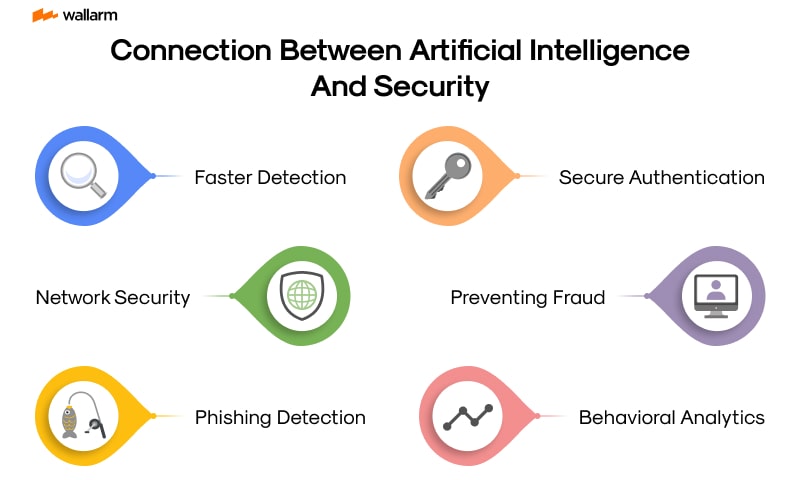
Artificial Intelligence (AI) has emerged as a powerful tool in the realm of national security, enabling governments and defense organizations to address complex security challenges more effectively. By leveraging AI technologies, national security agencies can enhance their ability to detect, respond to, and mitigate threats in real time, all while optimizing decision-making and resource allocation. AI integration spans a broad range of applications, from defense systems and intelligence gathering to cybersecurity and border protection.
Introduction
National security involves the protection of a country’s citizens, resources, and institutions from various threats, including terrorism, cyber-attacks, espionage, and military aggression. As these threats evolve and become more sophisticated, AI has proven to be an indispensable tool in enhancing the capabilities of national security agencies. Through AI, organizations can process vast amounts of data, identify patterns and anomalies, automate responses, and predict potential threats with a level of speed and accuracy previously unattainable with traditional methods.
Key Areas of AI Integration in National Security
Intelligence Gathering and Analysis
AI can revolutionize the way intelligence agencies collect, analyze, and interpret data. With the ability to process large datasets from diverse sources, AI helps identify key patterns, trends, and potential threats.
- Big Data Analytics: AI systems can sift through massive volumes of unstructured data, such as social media posts, communications, and satellite imagery, to detect potential threats or patterns of interest.
- Natural Language Processing (NLP): AI-powered NLP tools can analyze human language, whether in written or spoken form, to extract insights from intercepted communications or public reports, assisting in the identification of emerging threats or terrorist activities.
Surveillance and Monitoring
AI technologies enhance surveillance systems by enabling the automation of monitoring tasks and the analysis of video feeds, sensor data, and other surveillance information.
- Facial Recognition and Object Detection: AI algorithms can be used in facial recognition systems to identify individuals in crowds or detect suspicious behavior in real-time. This is especially useful in high-security areas such as airports or government buildings.
- Automated Monitoring: AI can autonomously monitor video feeds, using computer vision and anomaly detection to flag unusual behavior, such as unauthorized entry or movements in restricted areas.
Cybersecurity and Threat Detection
AI plays a crucial role in national cybersecurity efforts by helping to identify and mitigate cyber threats, which are often complex and evolve rapidly.
- Intrusion Detection Systems (IDS): AI-driven IDS systems can detect unusual patterns of network traffic, signaling potential cyber-attacks, including Distributed Denial-of-Service (DDoS) attacks or malware intrusions.
- Predictive Threat Intelligence: Machine learning algorithms can analyze historical attack data to predict future cyber threats, enabling preemptive action before attacks occur. AI can also help assess vulnerabilities in critical infrastructure systems and strengthen defenses.
Autonomous Defense Systems
AI integration into defense systems enables the creation of autonomous or semi-autonomous platforms capable of responding to security threats without human intervention.
- Autonomous Drones and UAVs (Unmanned Aerial Vehicles): AI-powered drones can be deployed for surveillance, reconnaissance, and even offensive operations, all while operating independently or in coordination with human operators.
- Robotic Systems: Ground-based robotic units equipped with AI can be used in dangerous environments, such as bomb disposal or urban warfare scenarios, to protect military personnel.
Border Security and Immigration Control
AI can enhance border security by automating and improving processes such as border control, visa screening, and immigration enforcement.
- AI-based Screening Systems: AI-driven systems can automatically analyze and process visa applications or identify individuals who may pose security risks based on travel patterns, historical data, or facial recognition.
- Autonomous Border Patrol: AI technologies can be integrated with autonomous vehicles, drones, or surveillance cameras to monitor border areas more effectively, especially in remote or hard-to-reach regions.
Counterterrorism and Counterintelligence
AI can support counterterrorism efforts by enabling better intelligence analysis, identifying terror cells, and tracking the movement of terrorist groups or individuals.
- Social Media Monitoring: AI tools can analyze social media and communications platforms for terrorist-related activity or recruitment efforts, identifying early signs of radicalization or coordinated attacks.
- Predictive Modeling: AI-based predictive models can be used to forecast potential terror attacks based on historical data and trends, allowing authorities to take preemptive measures.
Advantages of AI in National Security

Speed and Efficiency
AI systems can process vast amounts of data far more quickly than humans, enabling real-time decision-making and responses. In national security contexts, this speed is essential in areas like cyber defense, surveillance, and threat detection.
Accuracy and Precision
AI algorithms, particularly those powered by machine learning, can identify patterns and anomalies with high accuracy, even in complex, noisy data sets. This precision is critical for tasks like identifying security threats, classifying objects in surveillance footage, or detecting cyber intrusions.
Automation and Reduced Human Error
AI can automate many security-related tasks, such as monitoring surveillance footage or processing large volumes of data, reducing the need for human intervention and minimizing the risk of human error. This allows security personnel to focus on higher-level decision-making.
Predictive Capabilities
AI’s ability to analyze historical data and recognize trends enables it to predict potential threats, allowing national security agencies to adopt a proactive stance instead of merely reacting to events as they occur.
Challenges and Ethical Concerns
Privacy and Civil Liberties
The use of AI for surveillance and monitoring raises concerns about privacy violations and the potential for widespread surveillance of citizens without proper oversight. Governments must strike a balance between ensuring security and protecting civil liberties.
Bias and Fairness
AI systems are trained on historical data, which can sometimes contain biases that might lead to discriminatory or unfair outcomes, particularly in areas like facial recognition or profiling. Ensuring fairness and accountability in AI-driven systems is essential to maintain public trust.
Vulnerability to Adversarial Attacks
AI systems themselves can be vulnerable to adversarial attacks, where malicious actors manipulate input data to deceive or confuse the AI system. This poses a security risk, especially in critical national security systems.
Reliance on Technology
Overreliance on AI systems can make national security operations vulnerable if the technology fails or is compromised. Balancing AI integration with human oversight is crucial for maintaining control and accountability.
Conclusion

AI integration into national security is transforming the way governments and defense agencies approach threat detection, defense strategies, and intelligence gathering. By enhancing speed, accuracy, and predictive capabilities, AI holds the potential to greatly improve national security operations. However, it is essential to address the ethical, privacy, and security concerns associated with AI deployment. With careful planning, regulation, and oversight, AI can be a powerful asset in securing nations against a wide range of threats in the digital age.

